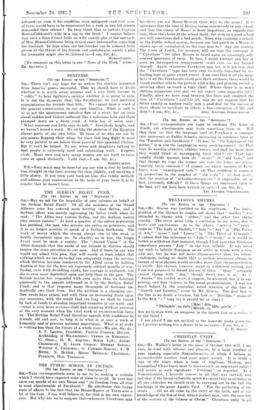TENNYSON'S RHYMES.
LTo THE EDITOR or THE " SPECTATOR."3
Sra,—Mr. Graves was justified in his scepticism. The juxta- position of the rhymes he singles out shows that " feather " was intended to rhyme with " either," end the other two rhyme exactly. The error arose from a confusion in uty motes, due to haste and carelessness. As to the others, "mirror "—" river** come in "The Lady of Shulott." " hair "—" ]ter" in "The Palace of Art," " muse " and "Lewes" in "The Third! of February." I cannot find the reference to " July "—" truly," so it would be better to withdraw that instance, though I feel sure that Tennyson somewhere accents "July " on the first syllable. It was never my wish to belittle Tennyson as an artist in words with a very nice ear, but lie was not more rhyme-perfect than his fellow- craftsmen, feeling no doubt that to eschew assonance always in favour of true rhymes would sacrifice more than rhyme-perfection is worth. Eye-rhymes, however, Mend on u different footing, and I ant not prepared to defend his use of them. " Quay " certainly cannot rhyme with " day," though Swift uses it so. As to "Azores," the verdict must, I suppose, be accepted, but it is sur- prising, and does violence to the usual pronunciation. I was not much helped by the somewhat weird scansion of the line in "Gareth and Lynette." given by Mr. Graves. The first foot in the line is no doubt a trochee, but how is " Meridim " scuttned? Is the first " i " long (n8 it should be) or short
I MOO dies
"Plffiephor I Os then morkii es He. I •."
Are we to scan with an anapaest in the fourth foot or a tribra.h in the third P
I am afraid I am not entitled to the honorific prefix given me, as I profess nothing but a desire to be accurate.-1 am, Sir, (M..
C. It. HAINits.






































 Previous page
Previous page